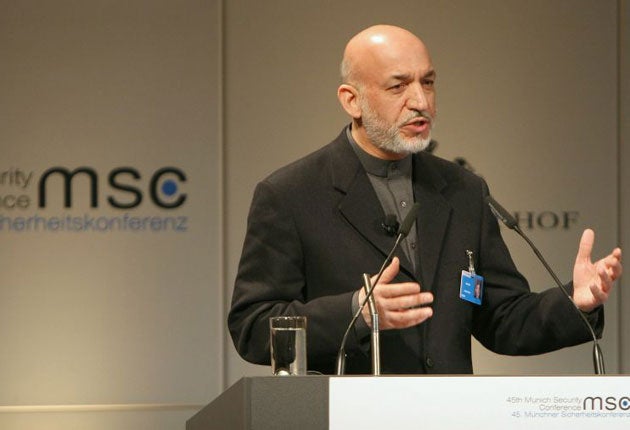Mary Dejevsky: America to change policy in Afghanistan

The Obama administration is comprehensively rethinking America’s approach to Afghanistan. At the top of the new list of objectives is “striving to secure and serve” the population.
Terrorism – the be-all and end-all of policy towards the region under President George Bush – is now seen as much as a product as a cause of Afghanistan’s instability.
National reconciliation is to be pursued as the longer-term objective. The new set of priorities was set out by General David Petraeus, author of the widely hailed “surge” policy in Iraq, in an address to national leaders and defence experts in Munich yesterday.
Now head of US Central Command, the general is co-ordinating a 60-day review of Afghanistan policy, ordered by President Barack Obama when he cameto office. Regional leaders, as well as US allies, including Britain, are being consulted about what can and should be done in what is now acknowledged by many to be a failing military operation.
The Afghan President, Hamid Karzai, who spoke shortly before General Petraeus, had clearly been told of the policy change, ditching most of a fierce speech inveighing against terrorism, in favour of a more selfcritical and conciliatory approach.
Conceding that the Taliban had gained significant ground in recent months, he said he would invite fighters who might want to return to their families and a “normal life” to take part in the nationwide elections in August.
General Petraeus made no mention of an Iraq-style “surge”. And while lamenting that more of everything was needed – more planes, more helicopters, more vehicles, more troops, more police, more trainers and more money – he followed other high-level US speakers in Munich by making no direct appeal to the European allies for more troops. This may well have been because part of the point of the policy review is to establish what is possible.
With a purely military solution rejected by the new US administration as not feasible, the emphasis – and the requirements – could well move away from combat troops towards police training and infrastructure projects.
There, combat-ready British, rather than the more risk-averse Germans, may therefore emerge as the odd ones out from the US policy review. It was striking that British ministers – the Defence Secretary, John Hutton, and theForeign Secretary, David Miliband – are still speaking the old US language of anti-terrorism, existential threats and combat operations. Some fast-footwork, Karzai-style, might be called for in London.
Join our commenting forum
Join thought-provoking conversations, follow other Independent readers and see their replies
Comments
Bookmark popover
Removed from bookmarks